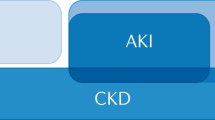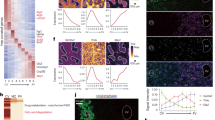Abstract
THE colchicine method was first used to study compensatory hypertrophy of the kidney by A. P. Dust in and S. Zylberszac1,2, who noticed that a few days after ligation of the ureter, colchicine induced numerous ‘stathmocineses' (arrested mitoses) in the kidney (Fig. 1).
This is a preview of subscription content, access via your institution
Access options
Subscribe to this journal
Receive 51 print issues and online access
$199.00 per year
only $3.90 per issue
Buy this article
- Purchase on Springer Link
- Instant access to full article PDF
Prices may be subject to local taxes which are calculated during checkout
Similar content being viewed by others
References
Dustin, A. P., and Zylberszac, S., Bull. Acad. Roy. Med. Belg., 149, 315 (1939).
Dustin, A. P., and Zylberszac, S., Acta Union Intern. contre le Cancer, 4, 680 (1939).
Herlant, M., Bull. Acad. Roy. Belg., Cl. Sci., 34, 85 (1948).
Hartman, F. W., J. Exp. Med., 58, 649 (1933).
Bollman, J. L., and Mann, F. C., Arch. Path., 19, 28 (1935).
Wilson, H. E. C., Biochem. J., 27, 1348 (1933).
Author information
Authors and Affiliations
Rights and permissions
About this article
Cite this article
HERLANT, M. Experimental Hydronephrosis Studied by the Colchicine Method. Nature 162, 251–252 (1948). https://doi.org/10.1038/162251b0
Issue Date:
DOI: https://doi.org/10.1038/162251b0
This article is cited by
-
94. Pathologie der sekundären Harnabflußstörung im Bereich der Niere und der oberen Harnwege
Langenbecks Archiv für Chirurgie (1969)
Comments
By submitting a comment you agree to abide by our Terms and Community Guidelines. If you find something abusive or that does not comply with our terms or guidelines please flag it as inappropriate.



